I read a quote from a woman judge recently, and it lines up so well with the advice that I give to young lawyers, both male and female. In the words of Patricia Brown Holmes, former Cook County, Illinois Judge:
Be like Nike and just do it — don’t let anything get in your way.
Of course, you must first go to law school and get the best grades possible — study hard and stay on top of every subject. Then get a job doing what you like.
We are always most successful when we are happy. So have fun as a lawyer. Learn. Explore. Watch. Soak it all in. Network with other lawyers so you develop and build relationships and references. Find judicial mentors. Learn their path as you develop your own.
Then, when the time is right and you have developed the skills, wisdom, judgment, confidence and support — make your move. If it does not happen, try again and again until you make it.
Great advice. Do what you like. Your work does not have to be your passion, but you need to enjoy your work.
Passion is not the same as enjoyment. People have passion for their families. People have passion for their hobbies, their avocations, and their artistic pursuits. People even have passion for their pets. But when people have passion for their work, it usually means that they are ignoring families, things, and pursuits that could expand their lives and make those lives particularly pleasurable.
Workaholics may believe that they have passion for their work, but, too often, they leave trails of lost opportunities in marriages and families behind them. You do not want to be one of them.
My professional experience lines up with this approach. I loved my work as a trial lawyer until I had a family. After that, my priorities changed. I put less emphasis on upward mobility and more emphasis on the quality of my work. I gave up partnership to be able to work part-time and meet the needs of my family. I ultimately gave up private practice and chose public service for the same reasons. And I never looked back or regretted my choices. Eventually, when my children were older and more self-sufficient, I returned to private practice as a partner.
Many women do not have to make those tough choices in today’s private law firms. Part-time lawyers can make partner today. There is far more flexibility in schedules to allow for family time and practice time. But, it may not be enough. Each lawyer has a unique view of job satisfaction, and it is all very personal.
So, be scrutinizing of your work opportunities. Find what you enjoy doing, and do it. Do not settle because you have been in a job for a long time and do not know how to leave. Don’t settle because you do not want to admit defeat. Don’t settle because you are afraid of the way others will perceive you. Figure it out. You will look back years later and be very satisfied with your decision. And you will have taken your best shot at happiness in your work.
It takes bravery and confidence to make tough decisions. But if you want it bad enough, you will reach deep down to pull out those attributes and live up to the promise that you should have made to yourself: Do not let you stand in the way of your happiness.













